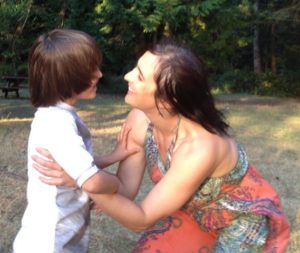Mindful parenting helps parents to remain present, and compassionate when our children become emotionally explosive. Rather than succumb to the impact of stress, and negative reactions such as yelling, withdrawing, or using threats or bribes, mindful parenting helps parents and children to effectively manage difficult emotions.
Eight year old Ian can’t find his favourite ball. He stamps his feet, complains loudly, and flings toys across his room narrowly missing his younger brother. His mother, Irene, hears the kerfuffle and immediately drops making dinner, and charges into his room. “Ian, stop!” she says in a loud, stern voice, “This is unacceptable behaviour! Time-out by yourself right now!”.
Many parents know this moment well. Our child is out of control, and our survival brain kicks in to help us regain control. It happens so fast that we seldom notice the cascade of physical sensations, thoughts, emotions, and impulses that drive our reactions…
Stress is a force that hastens our feeling of overwhelm. In the grip of stress, we are like a deer in the headlights of our negative judgments about our child and ourselves. We can be quick to anger – a common emotional reaction to shield us from feelings of helplessness and overwhelm.
Doling out time-outs, threats, punishments, and bribes are often a means to force our child’s emotional reaction to quickly abort. In truth our discomfort is with our own emotions which are triggered by our child’s distress, and accompanying difficult behaviours. When our own out-of-control feelings are intolerable, reactive parenting is a go-to when we need an expedient way out.
What’s lost in reactive parenting is the opportunity to:
- Be emotionally attuned to our child
- Strengthen our connection and secure attachment with our child
- Gain a deeper understanding of what our child’s behaviour is actually telling us, such as “I feel overwhelmed/confused/out of control/like a bad kid”
- Get curious about what underlies our own reactivity, such as “I feel overwhelmed/confused/out of control/like a bad parent”
- Acknowledge what we feel, self-soothe, and compassionately lean into our own and our child’s emotions.
At the heart of mindful parenting is the clarity that our emotional reactions contain important messages that we need to hear. Difficult behaviour is often an expression of pain. When we’re having a hard time we need more love, not less.
This does not mean turning a blind eye to destructive or harmful behaviour – love is also about setting limits.
Noticing how we create healthy boundaries – with kindness and understanding, or reactivity – is the journey of mindful parenting.
Mindful parenting provides us with space to gain a deeper understanding of how our reactive parenting styles are often influenced by our own upbringing, and the constellation of relationship dynamics that we grew up in…
If our parents were emotionally unavailable to us when we were angry or upset either by getting very angry, or isolating from us, we may have learned that upset emotions and access to love and care are mutually exclusive.
When we get the message that difficult emotions are bad because they cause a loss of connection, we often repress or deflect them in unhealthy ways.
Grown-up Ian may learn that his emotions can’t be trusted so that when he feels vulnerable, he either isolates from family and friends, or uses substances to take the edge off – both of which get in the way of the intimate bonds he craves.
Duncan, Coatsworth & Greenberg (2009) have identified four elements which contribute to effective mindful parenting:
- Listening with full Attention
- Non-judgmental acceptance of self and child
- Emotional awareness of self and child
- Self regulation in the parenting relationship
- Compassion for self and child
With a mindful parenting approach to Ian, Irene might take a moment to take a deep breath, check in with how stress shows up in her body, and compassionately acknowledge how she feels as she approaches Ian.
“Ian,” I see that you feel really stressed and upset right now.” Irene looks at Ian with care and concern, her facial expression and tone of voice are calm and empathic.
“Yes! I’m very angry! Angry, angry, angry!” Ian shrieks.
Irene: “Yes, Ian, I can see that. You really want to find your ball and you’re really frustrated that it’s not here,” she says as she drops down to Ian’s eye level, and allows him to feel that she is here for him.
Irene can tell that Ian is calming down, the colour is leaving his cheecks, his breath is getting deeper, and he seems like a sail boat that’s just run out of wind – he looks tired.
There is no perfect parent, and to try to be one is a self-defeating prophecy. Mindful parenting can help us to recognize the impact of stress on how we respond to our children. Curiousity and compassion for our own and our children’s emotions is a starting point for understanding the legacy of our own developmental experiences. With mindful parenting we can respond with awareness, patience, acceptance, and compassion, and let our children know that we are here for them no matter what.
References:
Duncan, L. G., Coatsworth, J. D., & Greenberg, M. T. (2009). A model of mindful parenting: Implications for parent–child relationships and prevention research. Clinical Child and Family Psychology Review, 12, 255–270.
Mindful Parenting: A Guide for Mental Health Practitioners by Susan Bogels & Kathleen Restifo.
Parenting From the Inside Out by Daniel J.Siegel and Mary Hartzell
Raising Your Kids Without Raising Your Voice by Sarah Chana Radcliffe
Click here for information on Joelle’s Mindful Parenting course.
Mindful Parenting
Learn more about my mindful parenting course.

